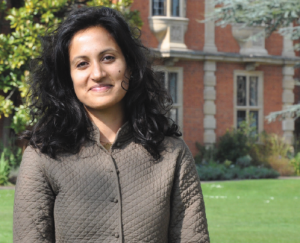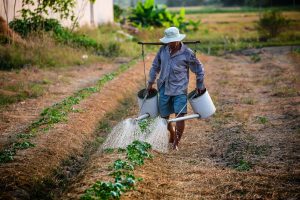Reform of irrigation systems in the Indian state of Madhya Pradesh has transformed the agricultural sector and the lives of poor farmers. The Oxford India Centre for Sustainable Development hosted a discussion in which policy-makers and academics debated the lessons for water security.
The story of irrigation reform in Madhya Pradesh (M.P.), a central state in India with 72m people of whom more than 80% are employed in agriculture, reflects deepening challenges to food and water security in the context of climate change.
On October 11, The Oxford India Centre for Sustainable Development (OICSD), the Smith School of Enterprise and Environment (SSEE), and the Oxford Water Network (OWN) co-hosted an event titled “Irrigation in India: Building Farms of the Future” at Somerville College.
The guest speaker, Shri Radheshyam Julaniya, Additional Chief Secretary of the Water Resources Dept, Government of Madhya Pradesh, explained how the state government, with the help of the World Bank, had embarked on a irrigation reform project that helped the state achieve some of the fastest agricultural growth rates in India.
In 2010, Mr Julaniya inherited a government water resources department in crisis and a World Bank project that had made little progress since its launch in 2005. Two years after the project closed under his leadership, the transformation was so striking that despite the 2017 droughts, the state witnessed a bumper crop that year, the minister said.
He achieved rapid reform by focusing on two things: repairing broken irrigation systems and institutional reforms in the department. Targeting investments on upgrades to broken infrastructure led to the modernisation of more than 200 water tanks and canals which functioned to their designed capacity for the first time in thirty-five years.
This increased the irrigated area in the state from 750,000-800,000 hectares in 2010 to nearly 4m hectares today, enabling farmers to receive crucial irrigation water to grow crops.
Mr Julaniya and his team also focused on training farmers in Water User Associations which empowered farmers to actively participate in maintaining small-scale irrigation canals. He also fostered a new culture of regular maintenance of canal systems and timely canal water release, as well as rewarding the intensive efforts of his staff. However, Mr Julaniya pointed out that these reforms were just the beginning. Future challenges for the state include adopting water-saving and energy-efficient agricultural technologies like drip and micro-irrigation systems while managing agricultural production to prevent food waste.
The event was convened by OISCD scholar Ranu Sinha (DPhil in Water Science, Policy and Management), formerly one of the World Bank team members on the project, who also shared her DPhil research findings that examined the impacts of the reforms. The event was opened by Sam Gyimah MP, the Minister for Universities, Science, Research and Innovation, Jan Royall, Principal of Somerville College, and Manish Singh, the Minister (Economic) High Commission of India and former Project Director of the Madhya Pradesh water sector reform project.
Ms Sinha’s presentation illustrated her PhD findings, which focus on insights into the impacts of irrigation investments that go beyond infrastructure and agricultural growth. She embarked on the research around irrigation impacts as this is a core ingredient for sustainable food and water security, as 70% of global and potable water resources are used to grow food. During the last three years, she gathered data on crop yields and rainfall patterns across multiple districts in M.P. between 2005-2015. She compared data from districts that received investments from the World Bank projects with districts that did not. She also interviewed more than 900 farming families in these same areas to understand their welfare, behaviour and adoption preferences before and after the reform. Her work shows that monsoon patterns are highly variable across districts (within a single river basin) and that rainfall patterns still impact yields in dryer regions despite the renovated canals.
She also found that farmers in areas with surface water investments report improved well-being but paradoxically are less willing to adopt technologies like micro-irrigation as they no longer have a constraint on surface water availability for their crops. Meanwhile in districts with broken irrigation systems, farmers are more like to use micro-irrigation and are often more socio-economically disadvantaged farmers from vulnerable caste groups. Finally, she found the government’s policy of buying cereal crops at guaranteed Minimum Support Prices (MSP) was biasing farmers away from planting higher value crops.
Ms Sinha’s findings were supplemented by discussions from Professor Simon Dadson (Professor of Hydrology at the School of Geography and the Environment), Dr. Dustin Garrick (Associate Professor in Environmental and Resource Management) and Professor Robert Hope (Professor of Water Policy and Director of the Water Programme at SSEE). They noted the importance of measuring rainfall changes over time and space and adapting infrastructure and governance to this climate variability, while incorporating choices and behaviours of agents or users and their ability to impact a system. They also highlighted the need for science, research, and policy partnerships to bridge gaps as well as partnerships with critical and self-reflective governments such as the M.P. govt, to make a difference in achieving outcomes to address these pressing challenges.
The evening concluded with a dinner hosted by Jan Royall for the invited speakers and delegates. Taking a page from the recently published book by Priya Parker, The Art of Gathering, the Principal of Somerville College led the group in “15 toasts to water”, where each guest makes a toast to “water” with a story of their own – with many in the group citing mentors and leaders who shaped their careers and their personal journey towards addressing these pressing challenges.

